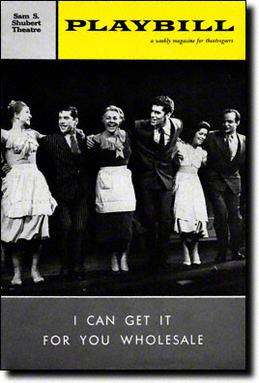
I Can Get It for You Wholesale
I Can Get It for You Wholesale is a musical, produced by David Merrick, music and lyrics by Harold Rome, and book by Jerome Weidman, based on his 1937 novel of the same title. Its 1962 production marked the Broadway debut of 19-year-old Barbra Streisand, who was nominated for the Tony Award for Best Performance by a Featured Actress in a Musical. The story is set in the New York City Garment District in 1937, during the Great Depression, and the songs utilize traditional Jewish harmonies evocative of the setting and the period of the show.
This article is about the stage musical. For other uses, see I Can Get It for You Wholesale (disambiguation).I Can Get It For You Wholesale
Background[edit]
In the album Just for the Record, Streisand recalls, "My first audition for the show was on the morning after Thanksgiving in 1961. Since the action took place in the 1930s, I showed up in a '30s fur coat that I'd bought in a thrift shop for $10. I sang three songs, including my new standby "A Sleepin' Bee". They asked me to come back and gave me "Miss Marmelstein" to learn for my second audition a few hours later." Harold Rome said, "The 'Miss Marmelstein' number was written before the casting of Barbra Streisand in the role, but her part was then enlarged. Somebody is that good ... you try to use them as much as possible."[1]
Productions[edit]
The 1951 film with the same title is based very loosely on the original novel.
The musical premiered on Broadway at the Shubert Theatre on March 22, 1962. Directed by Arthur Laurents and choreographed by Herbert Ross, it starred Elliott Gould as Harry Bogen. In addition to Streisand in the small role of Bogen's secretary, Miss Marmelstein, the supporting cast included Lillian Roth as Mrs. Bogen and Marilyn Cooper as Ruthie Rivkin, with Harold Lang, Bambi Linn, Ken LeRoy, and Sheree North. On October 1, it transferred to The Broadway Theatre, where it closed on December 9 after a total run of two previews and 300 performances. Gould and Streisand later married.
In 1991, the American Jewish Theatre staged a revival directed and choreographed by Richard Sabellico. The production starred Evan Pappas as Bogen, Carolee Carmello as Ruthie, Jim Brachitta as Teddy, and Vicki Lewis as Miss Marmelstein. It was nominated for the Outer Critics Circle Award as Best Revival, and Best Actor in a Musical for Pappas.[2]
In 2002, Arcola Theatre in London, a former clothes factory, produced the show for its second anniversary. The director was Mehmet Ergen with co-director William Galinsky.[3]
In 2023, the Classic Stage Company staged a revival starring Santino Fontana, Judy Kuhn and Julia Lester.[4][5]
Plot[edit]
Harry Bogen is an ambitious, unscrupulous young businessman in the 1930s New York City garment industry. He will stop at nothing to get to the top: he lies to his mother and his long-suffering girlfriend, Ruthie Rivkin, who try to help him become a better person, but he embezzles company funds from Apex Modes and betrays his friends and partners. Harry leaves Ruthie to take up with Martha Mills, a gold-digging dancer in Club Rio Rhumba, as tough and hard as the diamonds Harry rewards her with. But Harry goes bankrupt and loses his fairweather friends. Only his mother and Ruthie stand by him, but there is a surprising ally to re-emerge from the past.
Response[edit]
The musical garnered mixed reviews and lost money despite a run of 300 performances. As theatre historian Ken Mandelbaum noted, How to Succeed in Business Without Really Trying had opened five months earlier with a similar, but more palatable, story. J. Pierrepont Finch is a much more "cuddly betrayer... and audiences were less willing to confront Wholesale's unflinching portrayal of Harry's little world of "men and ulcers on parade... that shouldn't detract from the fact that it was a daring and distinctive musical.".[11]
Howard Taubman of The New York Times wrote that the show generated a "lot of momentum" and added, "It is spirited in its appreciation of the garment-trade milieu, and both winning and tearfully sentimental in its treatment of Jewish folks and some of their Bronx folkways." He thought the score was pleasant, using "folklife motifs to distill the flavor of Jewish life." Saving the most lavish praise for last, he wrote that Streisand was the "evening's find... a girl with an oafish expression, a loud irascible voice and an arpeggiated laugh. Miss Streisand is a natural comedienne."[12]
The Time critic observed, "Wholesale relies heavily on Jewish folk and speech ways. But as comedy, Jewish dialect is in awkward transition, no longer funny and not yet English. Harold Rome's score is drab and his lyrics resemble either singing dialogue or nursery rhymes... Harold Lang and Sheree North make a scorching sex rite out of 'What's In It for Me?'... Barbra Streisand trips the show into stray laughs. For the rest, Wholesale is as quiet as Seventh Avenue on Yom Kippur."[13]